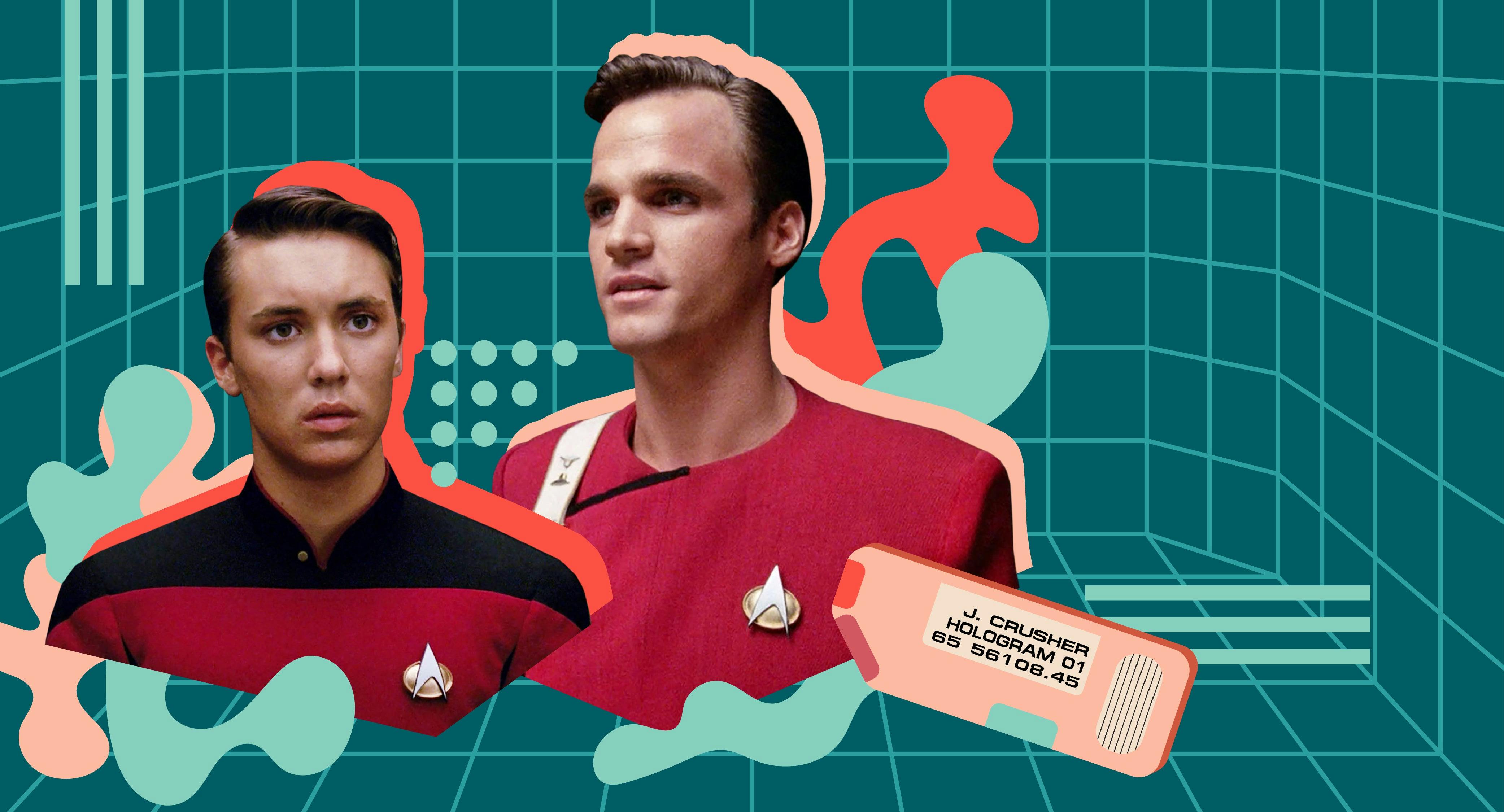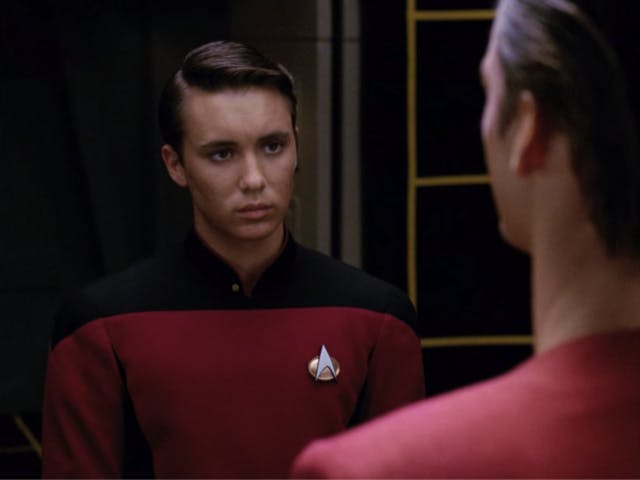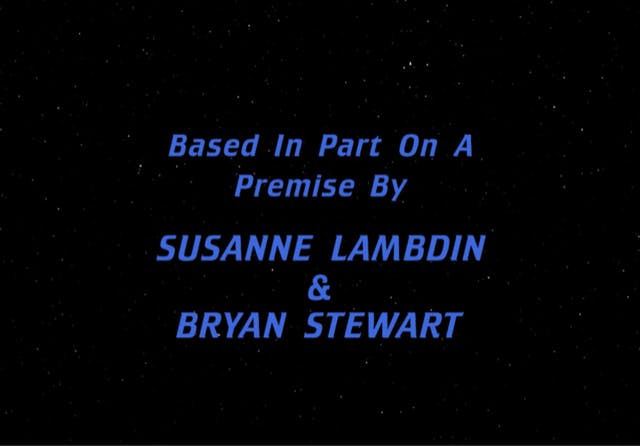Published Oct 5, 2021
My Dad Helped Carve Out a Place for Jack Crusher
One fan shares how her father shaped a key TNG plot point

StarTrek.com
Hard as it can be to fathom, our parents were people before we were born. My dad was once one such person. For a short time prior to my birth, as a freshly graduated 23 year old, he worked in the mailroom at Paramount Pictures, sorting, stamping, and delivering the studio’s mail for minimum wage.
One night on his regular route through the Paramount lot, he noticed an administrative assistant named Susanne typing furiously away at her computer, working on what looked like a screenplay. A short conversation ensued and soon the two studio underlings had joined forces to write a spec script for Star Trek: The Next Generation. This was 1989, when specs could feasibly find their way into executive hands, and my dad had written a subplot with real potential: what if Wesley Crusher, who’d soon be turning 18, finally came face-to-face with his late father, Jack? And what if the Enterprise’s Holodeck could be a portal for their meeting? For three seasons characters had repeatedly referenced Jack Crusher’s tragic death, and viewers had seen the tension that simmered between Wesley and his mother Dr. Beverly Crusher as a result of his untimely loss — the possibility of bringing Jack to life onscreen brimmed with narrative and emotional potential. Susanne assured my dad that his Jack Crusher idea was gold. Several weeks after submitting, the pair got an answer from The Next Generation: the spec had been turned down.
After some months, the disappointment of the rejection abated, and my dad was promoted out of Paramount’s mailroom and into the motion picture publicity department. His interest in screenwriting held steady, and he was able to arrange a lunch meeting to learn more about the craft with The Next Generation’s then story editor, Ronald D. Moore. One afternoon in 1990, at a restaurant steps from the studio’s Melrose entrance, my dad broke bread with Moore, who cordially shared insights into the intricacies of screenplay development. Their conversation eventually drifted to Star Trek, and my dad asked Moore if, in his role as story editor, he ever received scripts that involved Jack Crusher. “We get them all the time,” Moore replied, “and nobody wants to see Jack Crusher come to life. I don’t want to see him come to life, and neither does Michael Piller or Rich Berman or Gene Roddenberry.” It was a blow to hear, confirmation that an idea that had felt golden was actually radioactive. But my dad couldn’t help asking Moore: “What was the best Jack Crusher idea you ever got?”

StarTrek.com
Moore went on to describe a spec he once received in which Wesley turns 18, goes into the Holodeck, and meets his dad. “That was my script!” my dad blurted out. Discussion pivoted to the spec’s strengths and weaknesses, with Moore ultimately assessing it as worthy of a rewrite. With the necessary tweaks, the script might get made. My dad spent many subsequent nights hunched over his boxy Macintosh Classic, fine-tuning the screenplay until it was ready to resubmit. Once the rewrite was complete, my dad and Susanne sent it out one more time. Anxious weeks passed. Finally, a response arrived from the Star Trek writers: they wanted to buy the script. The acceptance note specified that they particularly wanted it for the Jack Crusher premise. My dad and Susanne were paid $1000 to split between them.
My dad’s Jack Crusher storyline materialized in Next Generation’s fourth season premiere, “Family,” which aired October 1, 1990. Wesley and Jack’s reunion arrives at the episode’s end, when Wesley enters the Holodeck and loads the program “Crusher One.” Jack, youthful and clad in a Starfleet uniform, appears before him. “Hello Wesley,” he says. “As I make this recording you are about ten weeks old. I wanted you to know who I am today. You see, this Jack Crusher won’t exist by the time you’re grown up.” Wesley is enraptured by his father, who looks not much older than him. Jack goes on:
“Let me just apologize for all the mistakes I’m about to make as you grow up. I hope you don’t grow up resenting the fact that I was gone so much. That comes with this uniform. I don’t know if I can explain why Starfleet means so much to me. Maybe you’ll understand when you get this recording. [...] I can see me in you, too. And I can feel that you’re my son. I don’t know how to describe it, but there’s this connection, this bond. I’ll always be a part of you, Wesley.”
Star Trek: The Next Generation — Wesley Crusher Comes Face-to-Face With His Late Father, Jack
Growing up in the 1970s, my dad was raised on Star Trek: The Original Series. He knew every episode inside out, cherished his vinyl-bound Starfleet Technical Manual, and wrote his own stories set on the Enterprise. In retrospect, it’s no surprise my dad — with his interest in international relations, reverence for logic, and love of good TV — was a fan from a young age. I was too, thanks to an early exposure to Star Trek that my dad facilitated.
Star Trek: Enterprise premiered shortly after I was born, and by the time I was in preschool, I spent Wednesday nights curled up on the couch next to him, loudly admiring Trip and Captain Archer, their action-figure doppelgängers seated in my lap. Once Enterprise ended, my dad and I embarked together on The Original Series. When he gifted me The Original Series box set for Christmas — each season encased in gold, blue, and red for the three Starfleet divisions — I cried tears of joy for the first time. (I remarked at my own tears that I didn’t previously know you could cry from happiness.) We recited lines back and forth like a secret language (“Don’t laugh at me!” I’d whine, parroting Charlie X; “I’m Captain Kirk!” he’d screech like Evil Kirk) and intermittently pondered the fates of our favorite characters (who included but were not limited to Harvey Mudd, Miri, Edith Keeler, and the Salt Vampire). Shortly after we worked our way through The Original Series, J.J. Abrams’ Star Trek reboot film was released; I remember leaving the theater in a daze, awed by one of my dad’s post-movie observations: did you see young Kirk was eating an apple during the Kobayashi Maru test, just like old Kirk eats an apple when he describes the Kobayashi Maru test in Wrath of Khan? I felt lucky I got to inherit a brain that noticed those kinds of things.
Star Trek II: The Wrath of Khan - How Kirk Passed the Kobayashi Maru's No Win Scenario
My dad also worked a lot. An executive at a nonprofit, he spent long hours in the office and sporadic weeks away on business trips. His job was such that he was absent during much of the holiday season, and on the rare days in December that he could spend at home he was too exhausted to really be present. He never missed a school play or a science fair, and I knew unequivocally that he loved me; at the same time, work often took him away from me, especially during the time of year I most wanted to spend with him. It was sometimes hard to see him devote himself as much to an organization as he did to me, but I understood how much the work meant to him. Now I work a lot too, maybe too much, and I can appreciate firsthand the allure of a meaningful vocation. When I was a kid, not so much.
This year I turn 23, the age my dad was when he first embodied Jack Crusher on the page. Recently, I’ve been spending nights hunched over my slender MacBook Pro, writing with the same fervor and conviction I imagine he had making those post-Moore-lunch script revisions. It’s strange to think that my dad conceived of the Jack Crusher monologue more than a decade before I was born and more than a decade before he took the nonprofit job. The inspiration behind Wesley and Jack’s reunion, he says, came from the kinship my dad felt with Wesley as a young man who lacked (and perhaps longed for) a strong male role model. When he wrote the Crusher spec, my dad saw himself in Wesley; when I watch the episode, I see my dad in Jack. When I hear Jack tell Wesley, “I hope you don’t grow up resenting the fact that I was gone so much,” I feel a jolt of recognition, a memory of my dad asking me if I resented how often his work took him away. Jack makes a recording in hopes that when Wesley watches he will understand; last year, my dad wrote a book about his time working at the nonprofit. He once told me he hoped that by reading it I would understand.
Kirk vs. The Kobayashi Maru's No-Win Scenario - Star Trek
Jack Crusher appeared several more times on The Next Generation, and it’s because of my dad. Star Trek has irrevocably shaped me as a person, and it’s because of my dad. I work incessantly, sometimes to my detriment, and it’s because of my dad. It’s difficult to grasp that our parents were people before we were born; it’s also difficult to grasp that our parents are still people after they become parents.
I called my dad before I wrote this essay, wanting to nail down the timeline and flesh out the specifics of the story behind the fabled Jack Crusher spec script. His recollections were lucid; he narrated conversations and created suspense like the good storyteller he is. I was surprised when he expressed some disappointment about how Jack and Wesley’s meeting ultimately manifested onscreen — some of the crucial details he’d included in the spec were left out of the final script. He had originally written, for instance, that Wesley stumbled across Jack’s message to him by surprise, and that his experience in the Holodeck — almost magical in its spontaneity — is shared with no one, as Jack recorded it with no one else’s knowledge. In the interest of expediency, “Family” has Beverly simply hand the recording over to Wesley. This change, my dad felt, robbed the moment of some of its intimacy and wonder.

StarTrek.com
Because of the final product’s deviation from his original vision, he didn’t tell anyone when the episode aired, even though the credits featured his name. But, now I tell every Star Trek fan I meet — did you know my dad made a direct, documented contribution to the Star Trek canon? Yeah, I guess it is pretty cool.
Sophia Stewart (she/her) is an editor, writer, and critic from Los Angeles. She lives in Brooklyn and tweets @smswrites.

